As the globalisation of higher education continues, UM recognises the importance of expanding external engagement to enhance teaching and research quality. Since relocating to a new campus on Hengqin Island in 2014, UM has seized every opportunity to refine its global strategy. The university has strengthened ties with partners in China, the Portuguese-speaking world, the English-speaking world, and neighbouring countries, extending its collaborative networks across the world.
Forging global partnerships
Over the last decade, UM has attracted students and scholars from around the world for exchange and learning. The university has also become a popular venue for international academic conferences. During this period, UM’s network of partner institutions has expanded from 183 partners in 2015 to 320 partners across 38 countries and regions in 2024. Additionally, up to 2024, UM has established student exchange agreements with 177 partners in 34 countries and regions, marking a significant increase from 122 partners in 2015.
UM positions itself as a university firmly rooted in Macao and committed to jointly developing the Guangdong-Hong Kong-Macao Greater Bay Area, integrating into the nation, and going global. To achieve these goals, the university has adopted a ‘4S’ internationalisation strategy, which focuses on strategic, substantial, specific, and sustainable objectives, as well as aims to deepen academic cooperation and provide more exchange opportunities for students.
Fortifying collaboration across China
UM has expanded its collaboration with leading universities in mainland China. The collaborative efforts include joint talent development initiatives and collaborative research and innovation programmes with Peking University, Tsinghua University, Nanjing University, Fudan University, Zhejiang University, and Harbin Institute of Technology, with the aim of integrating into national development. In December 2023, UM joined the Association of University Presidents of China (C9 League+) and established a ‘C9+3+1’ exchange and cooperation framework with nine universities in mainland China and three universities in Hong Kong. This initiative aims to enhance the development and exchange among China’s top-tier universities.
UM’s partnership with the Chinese Academy of Sciences (CAS) has yielded substantial results. In 2019, UM and the CAS Shenzhen Institute of Advanced Technology began joint supervision of PhD students. UM has also established joint laboratories with five institutes or research centres affiliated with CAS, spanning the fields of brain and cognitive sciences, artificial intelligence and robotics, aerospace information, ocean environment and engineering, as well as cancer and basic medical research. To date, these joint laboratories have initiated 27 research projects.
UM has long maintained strong partnerships with universities in Guangdong and Hong Kong. In 2016, a total of 37 higher education institutions in Guangdong, Hong Kong, and Macao—including UM—established the Guangdong-Hong Kong-Macao University Alliance, where UM served as the vice-chair. Furthermore, UM is a member of over 20 professional university alliances across the three regions. In 2019, UM initiated the establishment of the Alliance for Technological Innovation and Talent Development in Western Guangdong-Hong Kong-Macau Greater Bay Area, and served as the chair of the alliance.
In terms of other regional collaborations, UM co-founded the Jiangsu-Hong Kong-Macao University Alliance in 2021, where UM served as the vice-chair. This alliance aims to facilitate faculty and student exchanges among universities in the three regions, explore joint talent development initiatives, foster collaboration in advancing academic disciplines, and build collaborative laboratories and research centres.
Under a cooperation agreement signed with the National Judges College of China in 2021, UM’s Faculty of Law admits judges and judicial assistants from mainland China for doctoral and master’s studies, with the aim of supporting the country in the development of legal professionals. Additionally, in 2024, the faculty signed a memorandum of understanding with Hong Kong International Academy Against Corruption to enhance anti-corruption research and professional exchanges.
Deepening ties with universities in Portuguese-speaking countries
The university has established close partnerships with institutions across Portugal, Brazil, Cape Verde, and Mozambique. These partnerships include student exchange programmes with nearly 30 universities in these countries. Stephanie Andaluz Ramos is one such student who has benefited from these partnerships. She completed both her bachelor’s and master’s degrees at the University of Lisbon in Portugal. During her time there, she had the chance to collaborate with researchers from UM. In 2022, Stephanie decided to pursue a PhD in biomedical sciences at UM. She shares, ‘UM’s advanced research facilities and close ties with Portuguese and English-speaking countries made it stand out among Asian universities.’ Now at UM, she often travels between the university’s laboratories in Macao and mainland China. Her research focuses on microfluidic chips and genetics, including the development of an open database of BRCA gene mutations in the Portuguese-heritage population.
UM plays a pivotal role in fostering collaboration between the higher education institutions in mainland China and in the Portuguese-speaking world. A few weeks after moving to the Hengqin campus in 2014, UM hosted the 24th annual meeting of the Association of Portuguese-speaking Universities. During the meeting, UM was elected as president of the association (from 2014 to 2017), becoming the first institution from Macao to take on this role. In 2021, initiated by UM, the Academic Library Alliance between Macao Special Administrative Region and Portuguese-speaking Countries was established. The alliance seeks to enhance academic exchanges, promote resource sharing for Portuguese language teaching, and nurture Chinese-Portuguese bilingual professionals.
In 2023, UM established strategic partnerships with the University of Lisbon, the University of Porto, and the University of Coimbra. The collaborations include dual PhD programmes, faculty and student exchanges, as well as the establishment of joint research centres and laboratories in fields such as microelectronics, robotics, marine science, cognitive aging, pharmacy, law, and Portuguese language studies.
Prof João Veloso, former pro-rector of the University of Porto in Portugal, assumed the role of head of the Department of Portuguese at UM in 2022. He emphasises that UM plays an important role in the multilateral cooperation platform among Portuguese-speaking universities. This is due to UM’s strong emphasis on the Chinese, Portuguese, and English languages, as well as its extensive collaboration network that spans China, Portugal, Brazil, Africa, Timor-Leste, among other places. He believes that the shared language and historical connections greatly enhance the effectiveness of collaborations between UM and Portuguese-speaking universities.
Enhancing connections with universities in English-speaking and neighbouring countries
UM has expanded its partnerships with universities in the English-speaking world and neighbouring countries. Its partners include more than 30 institutions in Australia, Canada, the US, the UK, and other English-speaking nations. In 2017, UM introduced its first batch of dual degree programmes with North American universities. In 2019, UM launched a ‘1+3’ master’s and PhD dual degree programme with Imperial College London, the University of Bristol, and the University of Edinburgh, respectively. Moreover, in collaboration with Queen’s University Belfast, UM offers a ‘3+2’ dual bachelor’s degree programme in food science and nutrition.
Li Zhijie, a fourth-year student in UM’s Faculty of Business Administration and Honours College, completed a six-month exchange programme at Queen Mary University of London in 2023. During the exchange period, he had the opportunity to be immersed in multicultural communities, which broadened his international perspective and enhanced his adaptability and interdisciplinary research skills. As a result of his outstanding academic performance and experience abroad, Li has received offers from several prestigious master’s and doctoral programmes, including an offer from the University of Cambridge. He attributes this remarkable achievement to the rigorous training he received at UM in economic analysis, critical thinking, and the development of theoretical frameworks, which were further complemented by his invaluable overseas experience.
UM has intensified its cooperation with universities in neighbouring countries. In 2023, UM delegations visited around 15 institutions across Japan, South Korea, Thailand, Malaysia, and Singapore, with the aim of deepening academic cooperation in materials science, Chinese medicine and business administration, as well as expanding student exchange programmes. The collaborative efforts will further broaden UM’s international exchange platform, providing students with more learning and development opportunities.
Bolstering UM’s international presence
In recent years, UM has enhanced its international stature by participating in key conferences, including the annual meetings of the Asia-Pacific Association for International Education and the University Mobility in Asia and the Pacific, along with other global higher education events. In 2022, UM became a member of the Social Sciences Universities Network, further strengthening its ties and collaborations with academic institutions around the world.
Leveraging its well-equipped new campus, UM has become a preferred destination for international conferences over the past decade, attracting renowned scholars from around the world. Since 2014, the university, in collaboration with the United Nations Commission on International Trade Law, has co-host nine high-level meetings and a legal seminar. Other major conferences held on the UM Hengqin campus include the 24th annual meeting of the Association of Portuguese-speaking Universities, the inaugural Forum for Heads of Higher Education Institutions of China and Portuguese-Speaking Countries, and the third Guangdong-Hong Kong-Macao University Alliance Annual Meeting and Presidents’ Forum.
Over the past decade, UM has invited numerous distinguished scholars, including over 10 Nobel laureates, to deliver lectures at the university. Among them are notable figures such as Prof Robert C. Merton, Nobel laureate in Economic Sciences, and Prof Mo Yan, Nobel laureate in Literature, who both visited UM shortly after the 2014 relocation. More recently, in 2023, Prof Shuji Nakamura, Nobel laureate in Physics, delivered a lecture at the university. These lectures have significantly enriched the academic perspectives of students and faculty members.
Boosting UM’s global reputation
Regardless of geographical limitations, universities should strive to transcend local boundaries and foster global collaboration. UM, with an embrace of Macao’s cultural diversity and a thoughtfully designed campus, has cultivated strong partnerships worldwide. The university has not only reinforced ties with partners across China and Portuguese-speaking countries, but has also strengthened connections with institutions in the English-speaking world and neighbouring countries. Through these collaborations, UM aims to elevate its stature within the global academic community and continuously extend its international influence.
Chinese & English Text / Davis Ip, Senior UM Reporter Xu Wenxin, UM Reporter Wang Chuyue
Photo / Editorial Board
Source: UMagazine Issue 29
All articles in the special issue dedicated to the 10th anniversary of UM’s relocation to Hengqin Island:
- Rector’s words
- Key milestones of the past decade
- Nurturing innovative talent to embrace new horizons
- Breaking barriers through interdisciplinary research
- Optimising platforms to serve society
- Strengthening global networks
- Building an all-encompassing educational environment
- Seizing new opportunities from Macao-Hengqin integration
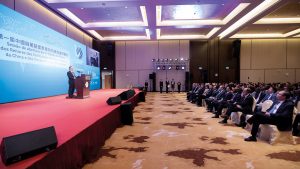
UM has held numerous international conferences, attracting the participation of many world-renowned scholars.
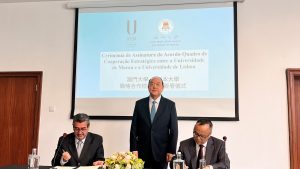
In the presence of Macao SAR Chief Executive Mr Ho Iat Seng (middle), UM and the University of Lisbon signed a strategic cooperation agreement to enhance collaboration with higher
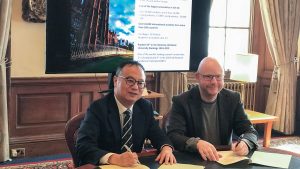
UM has expanded cooperation with higher education institutions in the English-speaking world
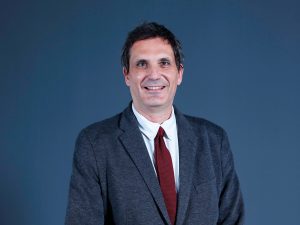
Prof João Veloso

Stephanie Andaluz Ramos
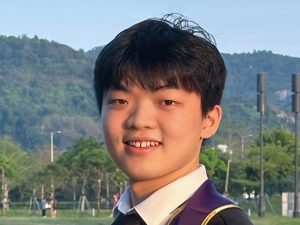
Li Zhijie
